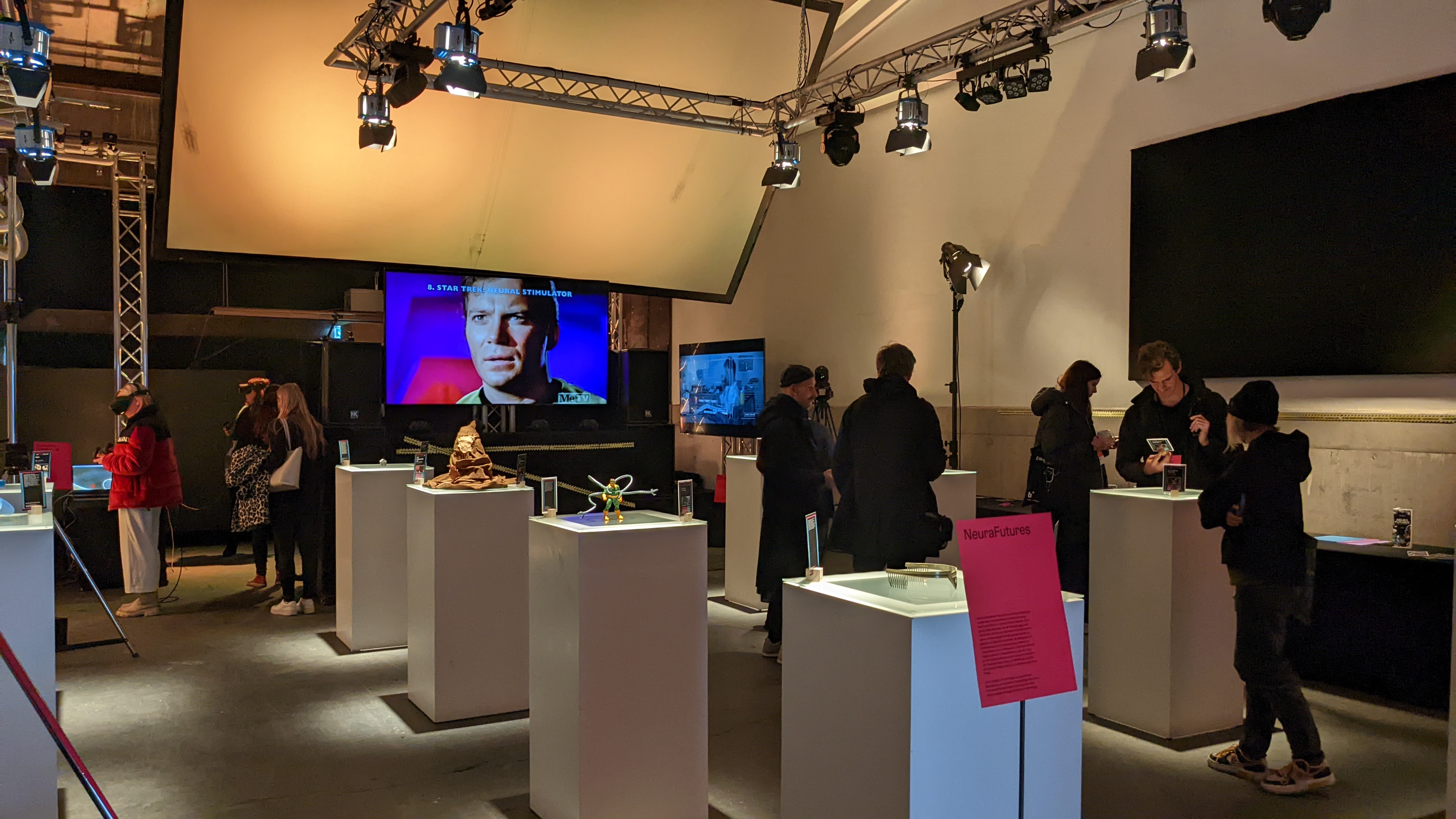Installation at Mind the Progress conference in Hamburg, Germany, October 2022

Die Kunstinstallation NeuraFutures ist ein Forschungsprojekt über die Darstellung von Brain-Computer-Interfaces (BCIs) in Science-Fiction-Medien. BCIs greifen über Sensoren, die am Kopf getragen oder implantiert werden, auf das Gehirn der Benutzer*innen zu. In der heutigen Forschung werden sie eingesetzt, um kognitive Zustände wie Müdigkeit, Aufmerksamkeit und Visualisierung zu messen, zu unterstützen und zu verbessern. In NeuraFutures zeigt das Team um Dr. Nataliya Kosmyna und Rinako Sonobe der Fluid Interfaces Group am MIT Media Lab BCIs aus Science-Fiction-Medien von Star Wars bis Harry Potter. Ist es möglich, Erinnerungen zu implantieren? Wie wäre es, per Gedanken Haushaltsgeräte zu steuern? NeuraFutures fordert dich dazu auf, deine eigene soziotechnologische Moral zu hinterfragen.
Science fiction has illustrated the fusion of humanity and technology for decades, and movies, novels, and video games featuring BCIs — which we call BCI-fi — are important to the acceptance of BCIs because they are the primary sources of the public’s experience with this kind of technology. As a result, BCI-fi exposes the public to possible futures and has a lot of influence over our feelings about these futures. BCI-fi calls into question our senses of humanity, ability, identity, and existence.
We designed an immersive art installation based on these ideas and our data, which is open to the general public: for our installation, we ask the attendees to face these senses and awaken themselves to their own sociotechnological morals.
We have brought with us 10 real-size physical prototypes, or props, of the neural devices featured in different BCI-fi, each of which represents different permutations of answers to these senses and morals — essentially, different futures. These props are organized around the space, and this space is open for exploration. 2 props are new for Hamburg. The public is also able to take a “FuturesTest” in which they make a series of choices about the future they hope or predict to see, the results of which is the prop in the space that is the most representative of their morals. The test requires users to consider new aspects of their identity and understand the ethics of AI and human-enhancement by asking questions about utopian vs. dystopian worlds, invasive vs. non-invasive technologies, and when they believe different neuratechnological events will happen. You may also take this test below.
The participants are also encouraged to vote for their preferred prop. In this way, over time, we are able to see which props — which futures — are the most popular ones, and hence how the public as a whole tends to predict/understand the future and which kinds of media/devices have the most influence on the public.
This experience highlights the paradox that humans are willing to exchange their own data, their identity, for social and emotional comfort. We often use technology to blend in, have fun, and stay up to date, but in this case, we have to expose the most intimate level of our identities, our biodata, to do so. Data privacy is not only a common theme in sci-fi but is incredibly relevant in society today, as biodata is becoming more and more accessible to the corporate world; we want to use the installation to expose—awaken the public to the dangers of surveillance capitalism, in the hopes that it sparks more action toward enacting proper biotechnological legislation. We ask at the end of the experience that the visitors reflect on the data that they gave up for their entertainment and mental growth, and consider whether preserving or growing identity is more valuable to the advancement of humanity.
Gallery
Share this page on social media:
© NeuraFutures.com all rights reserved 2021-2024
Copyright Disclaimer under section 107 of the Copyright Act of 1976, allowance is made for “fair use” for purposes such as criticism, comment, news reporting, teaching, scholarship, education and research. Fair use is a use permitted by copyright statute that might otherwise be infringing.